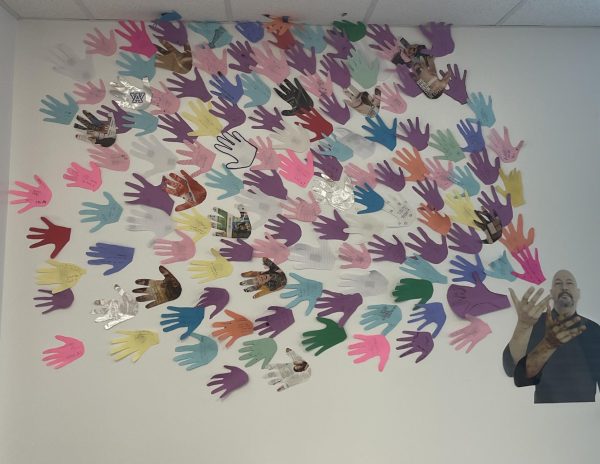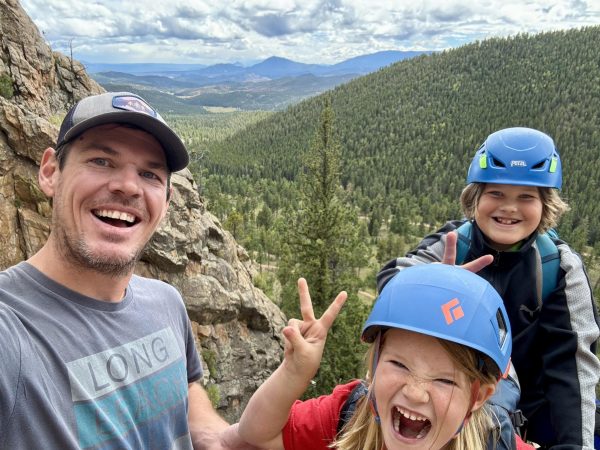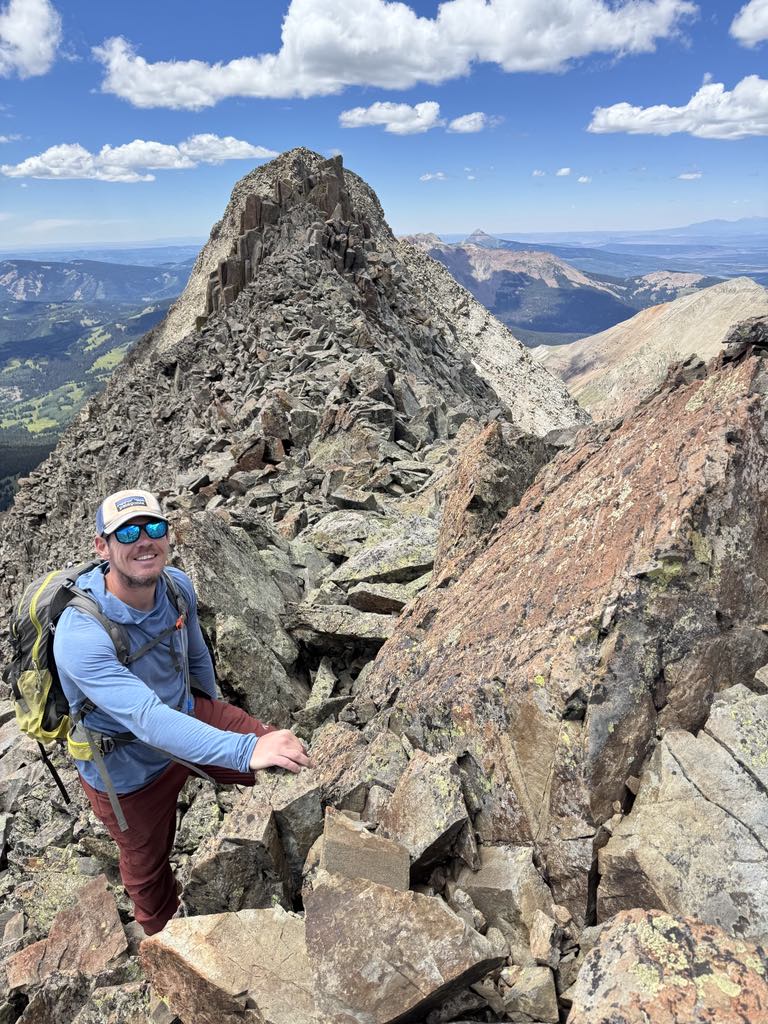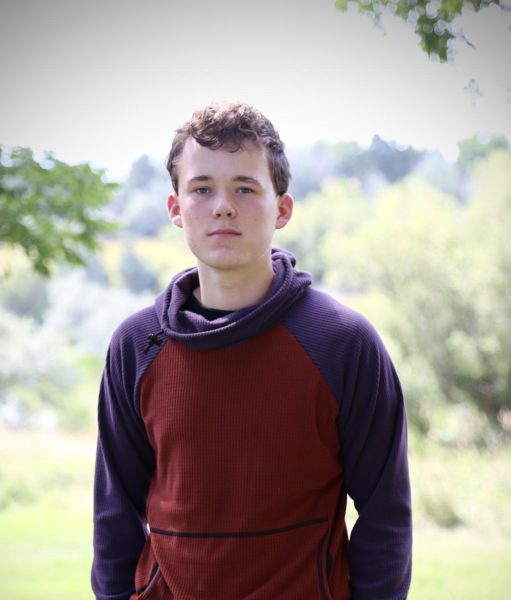As American Sign Language (ASL) teacher David Oyler adapts to his first year at Arvada West, he faces new challenges and opportunities that come with a different learning environment. While there is a lot of uncertainty ahead, there is one thing Oyler knows for sure: “I’m just really, really excited to be here. Everyone has been so kind. The staff, the students, everyone that I’ve met has been super, super helpful and warm and kind, which is really exciting for me.”
Path to A-West
Entering into his 19th year as an educator, Oyler has gained plenty of experience and knowledge. However, he wasn’t always sure teaching would end up being his career. “I went to college in South Carolina at Clemson University, and was kind of bouncing around different science majors. I wasn’t sure what I wanted to do. A big portion of my family are teachers, so they were kind of encouraging that route, but I hadn’t quite decided on that yet,” Oyler explains.
As a child and then teenager, Oyler grew up in Pennsylvania, playing soccer for his school team and participating in band. In terms of ASL, it ended up being a first person experience that pushed Oyler onto his current path. “The summer prior to going to college I had a boss whose son was deaf, so I learned a little bit of sign language that summer,” he shares.
This sparked a larger interest in the language, with Oyler taking ASL classes in college.
Even with a newfound interest in ASL, Oyler was still bouncing between science majors, trying everything from computer science to pre-med. He explains, “I thought maybe being outside, kind of enjoying nature, being in the mountains would be better. So it was environmental science [that I chose].”
This decision, coupled with his experience in ASL, led to a position teaching environmental science at Aspen Camp for the Deaf in the summer.
This is when things finally clicked for Oyler. “I had this skill set teaching the language and using the language of sign ASL, but then kind of melding both worlds together so that my passion for science and knowledge in that field could be used to teach, like a really specific demographic.”
He remembers thinking, “Not only do I love science and have this passion for sign language, but this could put both of them kind of together as a job.”
In his last semester of college, Oyler student-taught at a local deaf school, which rolled into a full time job. Oyler stayed there for five years before moving to Utah, where he taught at the Utah School for the Deaf and Blind. He then moved to Colorado, where he got a position at the Rocky Mountain Deaf School. He briefly shifted to teaching elementary school students in Evergreen before moving to A-West this year.
ASL
“I think it’s obviously a very visual language instead of an auditory language. And some kids really do well with that; the manual, the movement of your hands and your facial expressions. Kids get to be really expressive, and that brings kind of a personal element to it.”
Oyler adds “It gets to be artistic and pretty creative, which I think students really enjoy. And students this year have already been really amazing and creative with a language they’re just starting to learn.”

On top of other benefits, Oyler notes how sign language fosters engagement. “In sign language, you have to have eyes on the teacher. Like, if you check out, even if you look away to the corner, let alone put your head down or kind of tune out, you miss the entire lesson. And so far, the students have been super, super engaged.”
ASL is not without its struggles: “The challenge is always time, for the most part. The attention and interest is there” Oyler explains. Additionally, “Getting kids to care about what they’re learning about” can sometimes be an issue. Despite this, “The students have been phenomenal so far,” he shares.
With ASL already gaining popularity at Arvada West, Oyler continues to look ahead to the future. “I would love to connect with local deaf adults and students,” explaining, “they can all make a silent dinner or something. We would meet at whatever restaurant and just sign and not have anyone speaking.”
Additionally, Oyler hopes to further connect with the deaf community, sharing, “If you’re studying French, it’d be great to go to France, but it’s kind of far, kind of expensive. But within the United States, there’s so many deaf people here, so I think plugging into the community is going to be huge.”
He also sees a lot of room to grow the ASL program within A-West.
“It’s really fun because all five classes that I have this year are ASL one, so they’re all very beginner, but that means we’re laying the foundation, and students are just really, really impressive and excelling at it” he shares.
Looking ahead to future ASL one, two, and three classes, as well as potential honors courses and concurrent enrollment opportunities, Oyler adds, “The excitement’s there. During back to school night, parents and students came and were excited about ASL two, thinking about next year already and building to three and four, and I think that’s going to be contagious and just kind of spread and keep building from there.”
Personal Life
Regarding his personal life, Oyler loves nature, stating: “Get me in the mountains and I’m happy.” Recently he has focused on rock climbing, but he has also found joy participating in trail running races, where he runs in excess of 100 miles through the backcountry all in one push. He explains, “Normally the cutoff is 36 hours, so going without sleep and running, or at least kind of power hiking 100 miles is really hard, but it pushes me physically and mentally.”
Along with the outdoors, Oyler greatly values family; “Something like 80% of my family is in some sort of helper/supportive role,” he shares, adding, “Having that supportive kind of helper role in the community was really inspiring growing up, and I think that’s what lit that fire for me.
Side-by-side with the importance of family is the struggles of maintaining a healthy work-life balance. For Oyler, who has young kids and is constantly “continuing to think of new ways to challenge students or provide what the students need,” it can be tricky managing everything.
However, he explains, “That is one benefit to having all ASL one classes this year, that planning and prep…when I plan one class, I kind of have the skeletal work for all five of my classes this year.”

Overall, Oyler has come a long way from where he thought he’d be. And yet, he reflects on how his life has almost come full circle.
“I had always wanted to get to the mountains but went to school in South Carolina, so it was like, ‘I’m not where I’m supposed to be,’ whatever that means. But then life worked itself out that I went to Utah, and then now I’m here in the mountains, and I was teaching science, and then now I’m using the sign language that I used for 15 years as my passion and my career.”
The one thing he can say for certain? “There’s a path. There’s just finding it and being open to what’s gonna come.”



